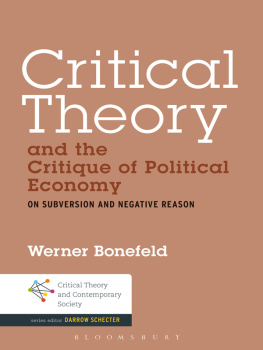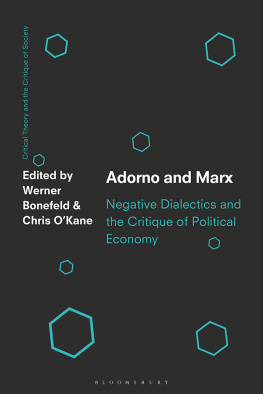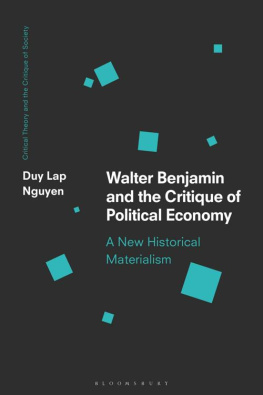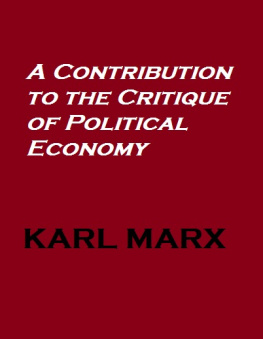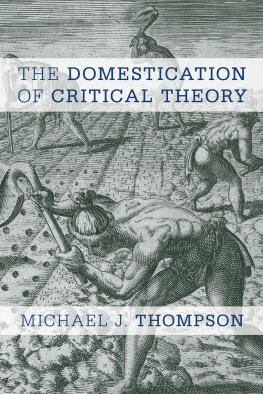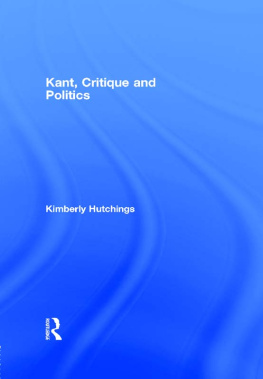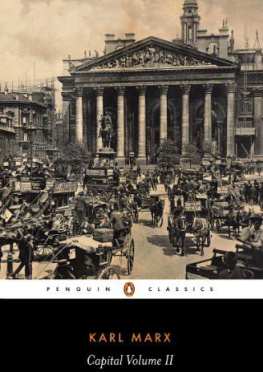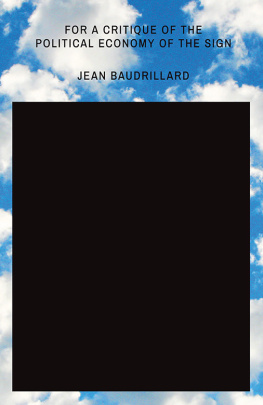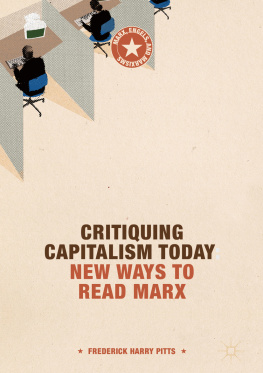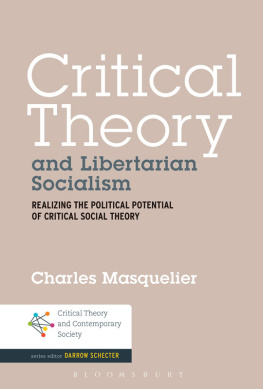Bonefeld Werner - Critical Theory and the Critique of Political Economy
Here you can read online Bonefeld Werner - Critical Theory and the Critique of Political Economy full text of the book (entire story) in english for free. Download pdf and epub, get meaning, cover and reviews about this ebook. year: 2014, publisher: Bloomsbury Publishing, genre: Politics. Description of the work, (preface) as well as reviews are available. Best literature library LitArk.com created for fans of good reading and offers a wide selection of genres:
Romance novel
Science fiction
Adventure
Detective
Science
History
Home and family
Prose
Art
Politics
Computer
Non-fiction
Religion
Business
Children
Humor
Choose a favorite category and find really read worthwhile books. Enjoy immersion in the world of imagination, feel the emotions of the characters or learn something new for yourself, make an fascinating discovery.
- Book:Critical Theory and the Critique of Political Economy
- Author:
- Publisher:Bloomsbury Publishing
- Genre:
- Year:2014
- Rating:4 / 5
- Favourites:Add to favourites
- Your mark:
- 80
- 1
- 2
- 3
- 4
- 5
Critical Theory and the Critique of Political Economy: summary, description and annotation
We offer to read an annotation, description, summary or preface (depends on what the author of the book "Critical Theory and the Critique of Political Economy" wrote himself). If you haven't found the necessary information about the book — write in the comments, we will try to find it.
Critical Theory and the Critique of Political Economy — read online for free the complete book (whole text) full work
Below is the text of the book, divided by pages. System saving the place of the last page read, allows you to conveniently read the book "Critical Theory and the Critique of Political Economy" online for free, without having to search again every time where you left off. Put a bookmark, and you can go to the page where you finished reading at any time.
Font size:
Interval:
Bookmark:
Critical Theory
and the Critique of
Political Economy
ABOUT THE SERIES
Critical Theory and Contemporary Society explores the relationship between contemporary society as a complex and highly differentiated phenomenon, on the one hand, and Critical Theory as a correspondingly sophisticated methodology for studying and understanding social and political relations today, on the other.
Each volume highlights in distinctive ways why (1) Critical Theory offers the most appropriate concepts for understanding political movements, socio-economic conflicts and state institutions in an increasingly global world and (2) why Critical Theory nonetheless needs updating in order to keep pace with the realities of the twenty-first century.
The books in the series look at global warming, financial crisis, postnation state legitimacy, international relations, cinema, terrorism and other issues, applying an interdisciplinary approach, in order to help students and citizens understand the specificity and uniqueness of the current situation.
Series Editor
Darrow Schecter
Reader in the School of History, Art
History and Humanities, University of Sussex, UK
BOOKS IN THE SERIES
Critical Theory and Film: Fabio Vighi, Reader and Co-director of the iek Centre for Ideology Critique at Cardiff University, UK
Critical Theory and Contemporary Europe: William Outhwaite, Chair and Professor of Sociology at Newcastle University, UK
Critical Theory of Legal Revolutions: Hauke Brunkhorst, Professor of Sociology and Head of the Institute of Sociology at the University of Flensburg, Germany
Critical Theory in the Twenty-First Century: Darrow Schecter, Reader in the School of History, Art History and Humanities, University of Sussex, UK
Critical Theory and the Digital: David Berry, Department of Political and Cultural Studies at Swansea University, UK
Critical Theory and the Contemporary Crisis of Capital: Heiko Feldner, Co-director of the Centre for Ideology Critique and iek Studies at Cardiff University, UK and Fabio Vighi, Reader and Co-director of the iek Centre for Ideology Critique at Cardiff University, UK
Critical Theory and Libertarian Socialism: Charles Masquelier, Lecturer in Sociology at the University of Surrey, UK
Critical Theory
and the Critique of
Political Economy
On subversion and negative reason
WERNER BONEFELD

To my son Declan. He is simply the best.
Contents
I had the good fortune to present some chapter drafts at conferences, including the May-Day conference in Ljubljana, May 2013, the International Conference on Neoliberalism, University of York, July 2013, the workshop on Critical Theory and Antisemitism, Cambridge, June 2013 and at a research workshop at the Centre of Social Movements, University of Glasgow, January 2013. I thank all participants for their insightful comments, discussions and helpful criticisms. Special thanks are due to Robert Fine, Lars Fischer, Nick Gane, Jay Geller, Vassiliki Kolocotroni, Anej Korsika, Michael Lebowitz, Brendan McGeever, David McNally, Stephen Shapiro, Hae-Young Song, Annette Spellerberg, Marcel Stoetzler, Ana tromajer, Erik Swyngedouw, David Seymour and Claire Westall. I am most grateful to Ana Dinerstein, John Holloway, Peter Hudis, Michaela Mihai and Chris Rogers for their very helpful comments and insightful remarks on chapter drafts. I am indebted to Greig Charnock, Vasilis Grollios, Richard Gunn and Chris OKane, who read the whole manuscript, seeing things that I failed to see. Thank you so very much for your generosity, insights, disagreements, help and encouragements. The responsibility for this piece of work is of course entirely my own.
Reason, left to work alone, creates monsters; while imagination unalloyed by the power of reason gives rise to futile ideas.
ADORNO AND HORKHEIMER, DIALECTIC OF ENLIGHTENMENT
Subversion and the critique of political economy
Subversive thought is none other than the cunning of reason when confronted with a social reality in which the poor and miserable are required to subsidize the financial system for the sake of sustaining the illusion of abstract wealth. Yet, this subsidy is necessary in existing society, to secure its wealth and prevent its implosion. This rational irrationality of a capitalistically organized mode of social reproduction is at the centre of the critique of political economy. It asks why human social reproduction takes this irrational form of an economic logic that asserts itself over the acting subjects as if by force of nature. The critique of political economy is intransigence towards the existent patterns of the world. It demands that all relations in which man is a debased, enslaved, forsaken, despicable being have to be overthrown. Debasement subsists as society unaware of itself, one in which human sensuous practice exists, say, in the form of a movement of coins that impose themselves objectively on and through the acting subjects as if the law of coins were a world apart from the social subjects who constitute the society governed by coins.
For the critique of political economy as a critical social theory, the fetishism of commodities entails the movement of some abstract economic forces that assert themselves over society on the pain of ruin. Yet, however objective in its nature, economic nature is in its entirety a socially constituted nature. The question of the social nature of the movement of coins is therefore one about the specific character of the capitalistically constituted social relations that assert themselves in the form of economic forces beyond human control. The money form disappears as a social relationship, and instead asserts an abstract economic logic, which, I argue, manifests the vanished social subject in her own social world as a personification of economic categories. The capitalist social subject is a coined subject.
There is, says Adorno, a need for a practice that fights barbarism, and yet, he argues rightly, there can be no such practice. The critique of reification asks what is reified and what therefore appears in reification. What appear in reification are the social relations of production in the form of self-moving economic things. However reified in its appearance, the economic world is and remains a world of definite social relations.
The fetishism of commodities does therefore not just comprise, as Moishe Postone argues in his critical theory of social domination, an opposition
Adornos point not only focuses the critique of political economy as a critique of the capitalist form of wealth, and its production, it also renounces the established view, according to which the critique of political economy is a critique from the standpoint of labour.
On the critique of political economy as a critical social theory
The context of this book is the new reading of Marx, which was principally developed by Hans-Georg Backhaus, Helmut Reichelt and also Moishe Postone. Reichelt and Bachkaus in particular developed the critical theory of the early Frankfurt school, especially Adornos account, as an alternative The new reading thus renounced the classical argument about trans-historically valid economic laws of development and in its stead, conceptualized the economic appearance of society as the necessary manifestation of definite social relations. Its stance entailed the further rejection of the idea that economic development is an expression of the struggle for hegemonic class power. The new reading argued that capitalist economic categories belong to the society from which they spring. In a society that asserts itself behind the backs of the acting subjects, one in which the individuals are really ruled by economic abstractions, the idea that society is after all nothing more than a manifestation of the balance of class forces is purely instrumental in its view of the social forces.
Next pageFont size:
Interval:
Bookmark:
Similar books «Critical Theory and the Critique of Political Economy»
Look at similar books to Critical Theory and the Critique of Political Economy. We have selected literature similar in name and meaning in the hope of providing readers with more options to find new, interesting, not yet read works.
Discussion, reviews of the book Critical Theory and the Critique of Political Economy and just readers' own opinions. Leave your comments, write what you think about the work, its meaning or the main characters. Specify what exactly you liked and what you didn't like, and why you think so.

